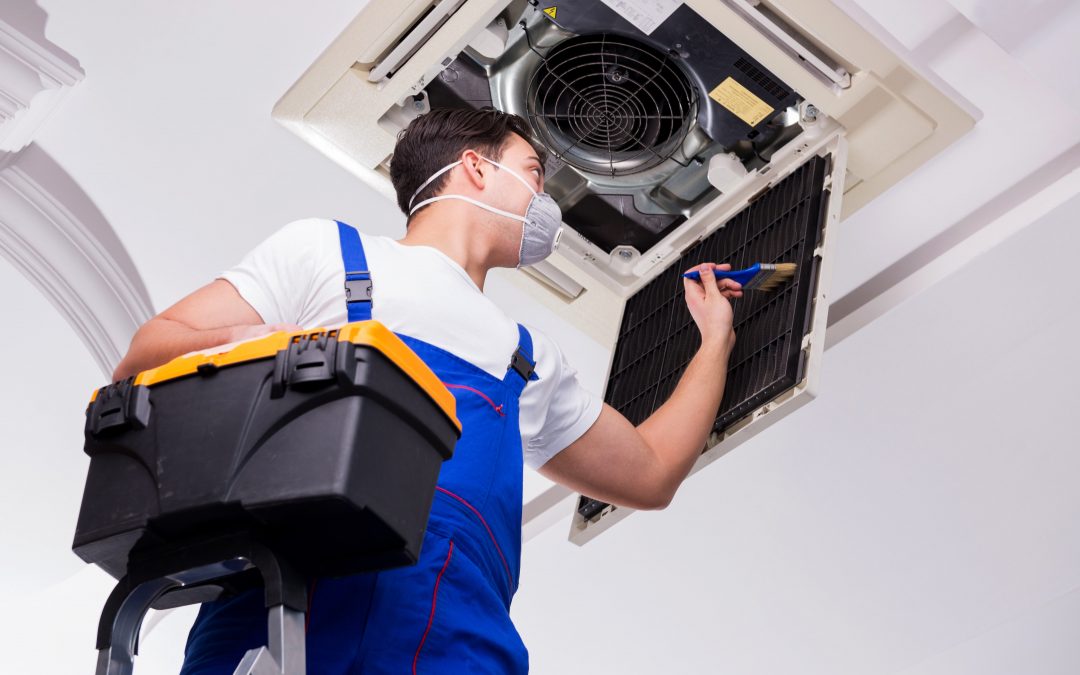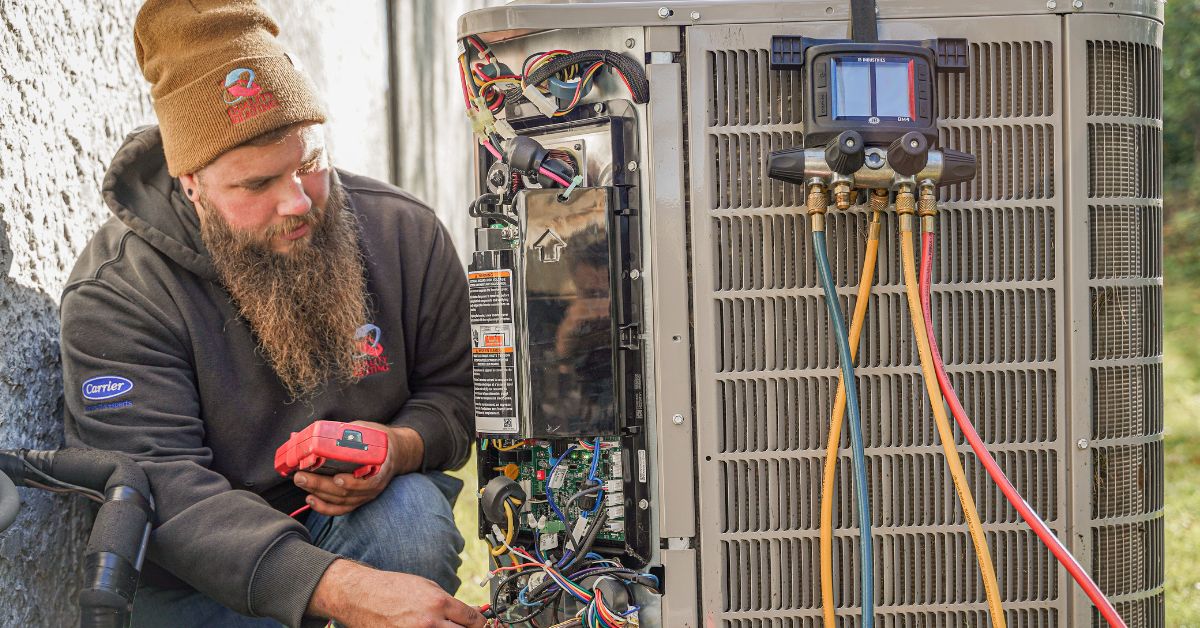The Importance of HVAC Expertise: Uncovering Sources Of AC Problems for Property Owners
Home owners typically ignore the relevance of recognizing their cooling and heating systems. Recognizing usual indications of a/c troubles can bring about timely interventions. Problems like inadequate air conditioning or unusual sounds are not simply annoyances; they can indicate deeper issues. By checking out the source of these issues, house owners can boost system efficiency and prolong its life-span. What are the most prevalent concerns that can develop, and just how can they be effectively resolved?
Common Indicators of AC Problems
Just how can property owners recognize concerns with their cooling systems prior to they escalate? Identifying common signs of air conditioner problems is crucial for timely maintenance. One prevalent indicator is inadequate air conditioning; if the air conditioning unit stops working to lower the indoor temperature level, it might signify underlying concerns. Uncommon sounds, such as grinding or hissing, can also suggest mechanical failures or loose components - HVAC company. In addition, homeowners should be careful of unusual smells emanating from the unit, which might suggest mold growth or electrical problems. Constant cycling on and off, known as brief cycling, can show thermostat issues or cooling agent leaks. Additionally, a boost in energy expenses without a corresponding surge in usage may indicate inadequacy. By remaining sharp to these warning signs, house owners can avoid more considerable issues and costly repair services, guaranteeing their a/c systems operate successfully throughout the warmer months

Comprehending Refrigerant Issues
Refrigerant concerns can greatly influence the efficiency of a HVAC system. Homeowners need to know the signs of low refrigerant levels and the relevance of spotting cooling agent leakages. Resolving these troubles immediately can prevent further damages to the system and warranty peak cooling down efficiency.
Reduced Cooling Agent Degrees
An usual problem that home owners may encounter with their heating and cooling systems is low refrigerant levels, which can significantly influence the system's efficiency and performance. Refrigerant is vital for the cooling procedure, soaking up warmth from indoor air and launching it outside. When levels go down, the a/c device battles to cool down the area properly, resulting in enhanced power usage and potential system strain. Signs of reduced refrigerant include poor air conditioning, longer run times, and ice development on the evaporator coils. Property owners may also see unusual noises as the compressor functions harder to make up for the deficiency. It is essential for homeowners to comprehend the relevance of maintaining appropriate refrigerant levels to guarantee peak a/c performance and longevity.
Refrigerant Leaks Discovery
Where might a homeowner begin when encountered with the opportunity of cooling agent leaks in their HVAC system? The initial step involves monitoring the system's efficiency. Indicators such as reduced cooling efficiency, ice development on coils, or hissing sounds may show a cooling agent leakage. Homeowners need to likewise look for noticeable indications of oil deposit, commonly an indication of a leak. Making use of a refrigerant leak detector can give even more precise recognition. If uncertainties continue, speaking with a qualified heating and cooling professional is vital, as they possess the competence and tools to find leaks efficiently. Prompt discovery and fixing of refrigerant leaks not just enhance system efficiency however also avoid prospective ecological injury, making it a crucial aspect of cooling and heating upkeep.
Electrical Failures and Their Effect
Electric failures can greatly impact cooling and heating systems, particularly with problems like circuit breaker breakdowns and damaged wiring. These issues not only interfere with the system's performance yet can also lead to costly repair work and security threats. Comprehending the effects of such failures is vital for property owners to maintain an efficient and safe cooling and heating setting.
Breaker Issues
Just how can breaker problems impact the efficiency of a HVAC system? Circuit breakers work as important safety devices that handle electric flow to HVAC units. If a circuit breaker trips regularly, it disrupts power supply, causing inconsistent heating or air conditioning. This can cause substantial stress on the system, resulting in ineffective operation and prospective damages to parts. Homeowners might observe raised energy costs because of the HVAC system's struggle to maintain preferred temperature levels. Additionally, duplicated disturbances from tripped breakers can shorten the lifespan of the air conditioning unit, calling for expensive fixings or replacements. Regular maintenance of breaker is crucial, as it ensures a stable power supply, eventually enhancing the general efficiency of the HVAC system.
Faulty Wiring Impact
Often overlooked, faulty wiring can have dire repercussions for heating and cooling systems. Wiring problems may lead to brief circuits, causing constant breakdowns and boosted repair service costs. On top of that, improper electrical wiring can trigger ineffective power use, resulting in higher energy costs and pressure on the system. In serious cases, damaged circuitry can set off electric fires, positioning a considerable safety and security danger to property owners. These electrical failings can damage A/c parts, resulting in pricey substitutes or extensive repair work. Property owners ought to prioritize routine inspections by qualified professionals to identify and rectify wiring troubles prior to they rise. Understanding the effects of faulty electrical wiring can assist ensure the longevity and safety of a/c systems, inevitably protecting both the home and its residents.
Clogged Filters and Their Consequences
While several homeowners might ignore the importance of normal filter maintenance, clogged up filters can bring about significant repercussions for HVAC systems. When filters become obstructed with dirt, dust, and particles, air flow is limited. This decrease in airflow forces the system to function harder, leading to boosted energy usage and possibly greater utility expenses. With time, this pressure can create damage on parts, causing early system failure.
Furthermore, clogged up filters can endanger interior air top quality. Contaminants and allergens might flow throughout the home, aggravating respiratory issues and allergic reactions for residents. Furthermore, poor air flow can trigger the evaporator coil to ice up, causing costly fixings and ineffective air conditioning performance. Routinely changing or cleaning up filters is a straightforward yet vital upkeep job that can help ensure the longevity and effectiveness this content of heating and cooling systems, eventually profiting both the home owner's convenience and their finances.

Thermostat Malfunctions Described
What occurs when a thermostat breakdowns can greatly influence both convenience and power efficiency in a home (AC repairman). A defective thermostat may stop working to accurately check out the temperature, resulting in overcooling or inadequate air conditioning. This disparity can cause discomfort for passengers and cause greater power bills, as the cooling and heating system functions more difficult than essential
Typical problems include dead batteries, which can make digital thermostats defective, and loosened circuitry that interrupts interaction in between the thermostat and the cooling and heating system. Furthermore, obsolete or improperly adjusted thermostats may not react properly to temperature modifications, better aggravating energy ineffectiveness.
Home owners ought to be alert for indications of malfunction, such as irregular temperatures or unanticipated power prices. Routine checks and understanding of the thermostat's functionality can assist recognize issues early, making certain peak efficiency of the a/c system. Dealing with thermostat issues quickly is important for keeping a comfy living environment and managing energy consumption effectively.
The Role of Normal Maintenance
Routine maintenance plays a vital duty in making certain the longevity and performance of HVAC systems. Homeowners who focus on routine checks can avoid small concerns from intensifying into pricey fixings. Regular upkeep normally includes tasks such as cleaning filters, inspecting ductwork, and inspecting refrigerant degrees. These tasks assist keep excellent air flow and system efficiency, reducing power consumption.
A properly maintained Cooling and heating system operates a lot more efficiently, offering constant comfort throughout the home. Normal tune-ups can also extend the life expectancy of the system, bring about substantial cost savings over time. Homeowners are urged to set up specialist evaluations at the very least annually to determine potential problems early.
Additionally, lots of producers need routine maintenance to support guarantees, making this technique not only advantageous however often essential. On the whole, recognizing the relevance of regular maintenance encourages house owners to secure their a/c systems versus unexpected failures and boost their financial investment in home convenience.
Frequently Asked Inquiries
How Can I Improve My Air conditioning's Energy Efficiency?
Improving an a/c's power efficiency involves routine upkeep, cleaning or replacing filters, securing ductwork, guaranteeing proper insulation, making use of programmable thermostats, and organizing expert assessments to recognize and remedy possible problems impacting performance.
What Is the Life-span of a Regular Cooling Unit?
A regular air conditioning system has a life expectancy of 15 to twenty years, relying on maintenance, usage, and ecological aspects. Routine upkeep can greatly expand its functional life and enhance overall performance.
When Should I Change My Air Conditioning System?
An air conditioning system ought to usually be replaced every 10 to 15 years. Indicators for replacement consist of regular fixings, rising energy bills, and insufficient cooling, showing that an upgrade might be extra cost-effective and efficient.
Can I Repair Air Conditioner Issues Myself?
Yes, people can troubleshoot a/c issues themselves by checking filters, ensuring power supply, and inspecting for noticeable issues (ac fix). Nonetheless, complicated issues commonly need specialist support for precise diagnosis and risk-free repair, making sure optimal system efficiency
How Do I Pick a Trusted HVAC Professional?

To choose a reputable HVAC professional, one need to look for suggestions, inspect online evaluations, confirm licenses and insurance, analyze more information experience, and demand in-depth price quotes to assure click here for info top quality service and fair pricing before making a choice.
Verdict
To summarize, a strong understanding of cooling and heating systems allows homeowners to properly identify and address usual a/c problems. Recognizing indications such as inadequate air conditioning or rising power expenses enables prompt treatments, which can significantly improve system performance and long life. By remaining notified about prospective troubles like cooling agent leakages, electrical failings, and clogged up filters, home owners can take proactive measures to keep their systems, inevitably ensuring convenience and promoting a much healthier living setting. Routine upkeep stays essential to this endeavor.